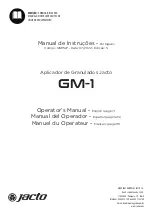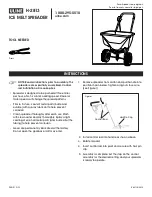
1
Table 1 - Stick Reader Features and Descriptions of Use
Feature Description
of
Use
Antenna Coil
1
Emits activation signal and receives transponder signal
Red Indicator
Illuminates whenever antenna is emitting activation signal
Green Indicator
Illuminates whenever a transponder has been read
Audible Beeper
1
Beeps once on first transponder reading and twice for repeat
READ Button
Initiates activation signal for reading transponder
Data/Power Cable
Conveys power to Reader and serial data from Reader
DB9F Connector
Connects serial data to PC or data logger RS232 port
DC Power Jack
Accepts 6 to 12 VDC input as Reader power source
Enclosure
Rugged, fiberglass, watertight case
Attachment Ring
Allows lanyard attachment for hanging
Handle Grip
Rubber anti-slip gripping surface
Strain Relief
Watertight cable entry
1
Item is internal to enclosure and cannot be seen in Figure 1 photograph
Power Source Requirements
The Stick Reader can be powered from a variety of DC power source options, either
through the DC power jack or through pin 9 on the DB9F connector. Recommended
DC Power sources are the Allflex PW50, PW250, or RFL100 Portable Rechargeable
Battery Pack, or PW409 AC Power Supply, which attaches to the DC Power Jack.
Note 1
-
Certain weigh scales and other equipment to which the Stick Reader can be attached
provide DC power on pin 9 of the DB9 interface connector. Such DC power sources are
acceptable as long as the voltage is between 6 and 12 volts DC, and are capable of providing
at least 500 milliamperes continuous current, and at least 1.0 ampere peak current. Pin 5 of
the DB9 connector is ground. A rechargeable sealed lead acid battery rated at 6 volts and 4.5
ampere-hours or greater is an excellent choice for portable and field applications.
Note 2
- When an external power source is connected to the DC Power Jack, inserting the
plug causes electrical continuity to pin 9 of the DB9 connector to be interrupted. Polarity on
the DC Power Jack is and center pin -. The DC power plug specification is a 2.5mm
x 5.5mm DC Coaxial (9.5mm length).
Note 3
- An AC power supply must be a linear regulated type unit rated at 6 to 12 VDC
output and 1.0 amperes minimum. Some AC power supplies may exhibit excessive noise that
can compromise read range of FDX-B type transponders. Suitable AC power supplies should
be rated at 3 millivolts or less output ripple.
Note 4
- The Stick Reader does not contain a power on/off switch. When a power source is
connected to either the power jack of pin 9 of the DB9F connector, the Stick Reader will
consume an idle current of approximately 25 milliamperes. When powered from a battery
source, be sure to disconnect the battery when the Stick Reader is not in use in order to
conserve battery life.
Note 5
- The Stick Reader is polarity protected against accidental reverse voltage application
and will not be damaged by such.
2
SPECIFICATIONS:
GENERAL
RFID Compatibility:
ISO 11784 & 11785 HDX and FDX-B
Form Factor:
Portable Handheld Fiberglass Rod Enclosure w/Rubber Handle Grip
User Interface:
Single “Press to Read” Activation Button
Red LED “Exciter Active” Visual Indicator
Audible Beeper and Green LED “Good Read” Visual Indicator
RS232 Serial Data Port
Software upgradeable via RS232 serial port
RS232 Serial Port:
1200 BPS to 57.6 KBPS (9600N81 default setting)
Serial Data Format
Decimal or Hexadecimal Mfr/Country Code + National ID Code
Memory:
Stores up to 1638 transponder codes in non-volatile memory for download
User Options:
Non-volatile mode control options selectable via RS232 serial port interface
Power/Data Interface:
1 meter coiled cable (extends to 3 meters) or 5 meter straight cable
w/DB9(f) connector & 2.5mm x 5.5mm coaxial power jack
Battery Power:
6 to 12 VDC External Battery or Mains Powered Supply
Electromagnetic
Compatibility (EMC)
Certifications:
FCC Part 15 Class A
CISPR 22 (EN55022), and EN50082-1
ETSI 300 330-2
Industry Canada RSS-210
PHYSICAL/ENVIRONMENTAL
Dimensions:
RS250-45: 45cm L x 32mm diameter (18” x 1.25”)
RS250-60: 60cm L x 32mm diameter (24” x 1.25”)
Weight:
0.62 kg. (22 ounces)
Material:
UL94V0 Fiberglass and ABS UL94 HB Plastic
Color: Black/Gray
Operate Temperature
-40ºC to +55ºC (IEC68.2.1/.2)
Storage Temperature
-40ºC to +85ºC (IEC68.2.1/.2)
Humidity:
0 to 95% (IEC68.2.56)
Altitude:
-100 to +3,000 meters
Mechanical Shock:
Per IEC 68-2-27 (15g/11mS sawtooth) & 1 meter free-fall drop onto
concrete)
Vibration:
Per IEC 68-2-6 (10-55 Hz sinusoidal/0.75mm displ./1 oct/min./10 cycles)
Hermeticity:
IP-67 (dust-tight/immersible) per IEC 529
RELIABILITY
MTBF: 50,000
hours
MTTR:
0.5 hours (not field serviceable)
Expected Life:
5 years, minimum
PERFORMANCE
Read Distance:
(@ 6 VDC)
(add 5 cm for 12VDC)
27cm (minimum - Allflex 30mm HDX/HP eartag)
20cm (minimum – Allflex 31mm FDX-B eartag)
Reading Orientation:
0º to 45º with less than 10% range decrease
Read Zone:
360º in radial and axial planes with respect to end of reader enclosure
Interrogation Rate:
~ 9 times/second
Read Error Rate:
Less than 1 in 10
6
Exciter Signal
Field Strength:
81 dBuV/m @ 10 meters with 6VDC power input
87 dBuV/m @ 10 meters with 12VDC power input
11
























